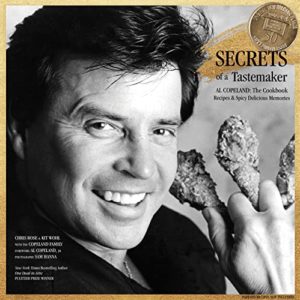 For a man who would introduce the world to the spice of Cajun and Creole food, Al Copeland’s early years held no indication of an epicurean future. Born in 1944, Copeland was largely raised in New Orleans’ St. Thomas housing project by his frail and sickly mother after his father left the household when his son was a toddler. The boy ate Vienna sausages and Spam. Food was simply sustenance, not a source of pleasure.
For a man who would introduce the world to the spice of Cajun and Creole food, Al Copeland’s early years held no indication of an epicurean future. Born in 1944, Copeland was largely raised in New Orleans’ St. Thomas housing project by his frail and sickly mother after his father left the household when his son was a toddler. The boy ate Vienna sausages and Spam. Food was simply sustenance, not a source of pleasure.
“That eating could serve as a joyous expression of life, of not only physical but also of social and emotional bonding, would have seemed absurd to young Al,” write Kit Wohl and Chris Rose in the opening chapter of Secrets of a Tastemaker, Al Copeland: The Cookbook, Recipes and Spicy Delicious Memories. Such tastebud-withering deprivation would change when Copeland met and eventually married Mary Alice Lecompte, a Cajun girl who would introduce her husband to the culinary delights of her family’s kitchen.
“Being with Mary’s family, he began to notice, appreciate and understand flavors and seasonings,” the book continues. This spice-blending alchemy over a humble stovetop would ultimately lead to one of the most successful food franchises in the world after Copeland established his first Popeyes Fried Chicken outlet in 1972 in the suburb of Arabi, downriver from New Orleans. By the time the founder lost his enterprise to bankruptcy in 1992, the franchise included more than 2,000 franchises in 25 countries.
“We called his Big Al,” writes son Al Copeland Jr. in a foreword to this combination cookbook and biography. “He was always an enigma to the outside business community. He kept his own counsel and was always confident in his vision. Few understood or witnessed his intense drive, his fierce determination, and strong will to succeed, which ultimately led to exceptional success. Secretive, he never shared a proprietary recipe and designed incredible security for his master recipes.”
Indeed, fans of Popeyes Fried Chicken will not find ingredients for the chain’s spicy batter in the pages of the cookbook, but there are a host of delectable recipes to be found within the 311 lavishly illustrated pages. Mouth-watering selections include such classics as shrimp and crabmeat remoulade salad, crawfish bread, oysters en brochette, eggs Sardou and those famous melt-in-your-mouth buttermilk biscuits.
In spite of Al Copeland’s clandestine business practices, he was known as a larger-than-life personality in the pantheon of New Orleans characters. Flashy from the get-go, in addition to his business acumen Copeland became a prizewinning speedboat racer and flamboyant showman whose his Christmas light display in Metairie became a must-see for thousands of motoring gawkers every Yuletide season. A lawsuit filed by annoyed neighbors only slightly dimmed the electrical extravaganza.
Readers will discover many fascinating tidbits in the book, among them:
• Copeland claimed he named the restaurant after the fictional detective Jimmy “Popeye” Doyle (portrayed by Gene Hackman) in the 1971 film The French Connection, which came out a year before the chain was founded, and not the comic strip character Popeye the Sailor (who later did become a company mascot).
• The name is spelled Popeyes, without the apostrophe commonly used by other restaurant chains such as McDonald’s and Hardee’s. Copeland claimed facetiously that he was “too poor” to afford an apostrophe.
• Many legends of Louisiana music have performed in Popeyes commercials for radio and television, including Dr. John, Fats Domino, Jerry Lee Lewis, the Neville Brothers, Doug Kershaw and the Olympia Brass Band.
• When the Superdome opened in 1975, Popeyes was one of the first advertisers to appear on the jumbo TV screens. Fans rose in the stands to sing the popular jingle “Love that chicken from Popeyes.” A reporter covering the game for Sports Illustrated wrote, “the Saints game was interesting, but the chicken ads were spectacular.”
At the close of the book, Copeland’s valiant battle against Merkel cell carcinoma, a rare form of cancer, is chronicled, including a trip to the holy Catholic shrine of healing in France at Lourdes before a final visit to Germany where he underwent experimental treatment. Copeland died there at age 64 in 2008.
“My last promise to our father is that we would seek a cure for the disease that cut his life short,” writes Al Copeland Jr. “We lost that battle but we won the war. Through the work of the community, researchers, and the Al Copeland Foundation, the FDA in December of 2018 approved a groundbreaking treatment for Merkel cell carcinoma. We are turning his legend into a legacy.”
Perhaps one quote that stands alone in the book sums up the Al Copeland story. In the words of the man himself: “I don’t know if I’m living the American Dream, but if I had to dream about it, I don’t know if I could dream it any better.”
Future book signings for Secrets of the Tastemaker include:
Thursday, September 29, 5 to 6:30 p.m. – Secrets of the Tastemaker Happy Hour at Copeland’s in Metairie, 4517 Veterans Memorial
Al Copeland Jr. will be signing books. Attendees may who enjoy discounted drinks and bites. Books are available for purchase at all Copeland’s locations.
Saturday, October 1, 1 to 3 p.m. – Book signing plus cooking demo at Garden District Book Shop, 2727 Prytania Street
Al Copeland Jr. and Kit Wohl will be on site signing books for the afternoon while the Copeland’s culinary team will be serving samples of two book recipes, blackened bayou chicken and pecan crust no-bake cheesecake, from a food truck.




